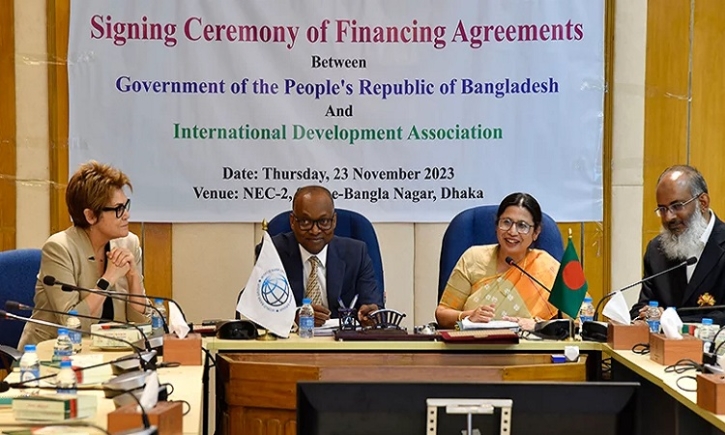Staff Correspondent
Published:2023-11-26 12:52:25 BdST
WB helps Bangladesh improve human development, climate resilience
Bangladesh and the World Bank have signed five financing agreements to help the country achieve resilient and inclusive growth by improving early childhood development, secondary education, riverbank protection and navigability, urban primary health, and gas distribution efficiency.
“Bangladesh is an important partner for the World Bank toward its vision of a world free of poverty on a livable planet. Since the country’s independence, the World Bank and Bangladesh have had an impactful partnership that lifted millions of Bangladeshi people out of poverty,” said Abdoulaye Seck, World Bank Country Director for Bangladesh and Bhutan.
“These projects will help preparing our children for a brighter future while improving resiliency to climate change,” the global lender said in a press statement on Thursday.
The five projects are:
The $210 million Bangladesh Enhancing Investments and Benefits for Early Years Project will help improve early childhood development by providing cash transfers and counseling services to about 1.7 million pregnant women and mothers of children under 4 years of age in vulnerable households.
The $300 million Learning Acceleration in Secondary Education Operation Project will help strengthen secondary education by improving learning outcome and teaching quality.
To help recover from learning losses incurred during the COVID-19 pandemic and to improve preparedness to future shocks, the project will introduce complementary online learning blended with in-class education.
To reduce dropout rates, the program will provide stipends to 8 million vulnerable students and ensure 5,000 schools have active sexual harassment and prevention committees in place.
The $102 million Jamuna River Sustainable Management Project 1, will help improve riverbank protection and navigability in the Jamuna River, protecting about 2,500 hectares of land from riverbank erosion and flooding, saving thousands of people from displacement and safeguarding their livelihoods and assets.
It will improve navigation channels with adequate depth that can accommodate large cargo vessels year-round and revive inland water transport and trade.
The $200 million Urban Health, Nutrition and Population Project will improve primary healthcare services for treatment, prevention and referral for common illnesses including mosquito-borne diseases like dengue in Dhaka North and South City Corporations, Chattogram City Corporation, and Savar and Tarabo municipalities.
It will also support mosquito control, medical waste management, and behavior change communication. It will help improve antenatal services for women, with a target of over 250,000 women receiving at least four checkups during pregnancy. It will support hypertension screening and follow-up of about 1.3 million adults.
The $300 million Gas Sector Efficiency Improvement and Carbon Abatement Project will help improve the efficiency of gas distribution and end-use through pre-paid metering systems and reduce methane emissions along the natural gas value chain. It will install more than 1.2 million prepaid gas meters in Dhaka and Rajshahi Division.
Prepaid gas meters and advanced monitoring systems will help optimize natural gas end-use, mitigate greenhouse gas emissions and lower gas bills for households and industrial users.
“Bangladesh and the World Bank have strong partnership focused on achieving the country’s vision of upper middle-income status by 2031 and higher income status by 2041,” said Sharifa Khan, Senior Secretary, Economic Relations Division, Government of Bangladesh.
“These projects are aligned with the Eighth Five-Year Plan 2021-2025 and support the country’s graduation from LDC status in 2026 and the vision 2041.”
The agreements were signed by Sharifa Khan and Abdoulaye Seck on behalf of Bangladesh and the World Bank, respectively.
The credits are from the World Bank’s International Development Association (IDA). Bangladesh currently has the largest ongoing IDA program totaling $16.46 billion in 57 projects.
The World Bank was among the first development partners to support Bangladesh and has committed more than $40 billion in grants, interest-free, and concessional credits since the country’s independence.
Unauthorized use or reproduction of The Finance Today content for commercial purposes is strictly prohibited.


